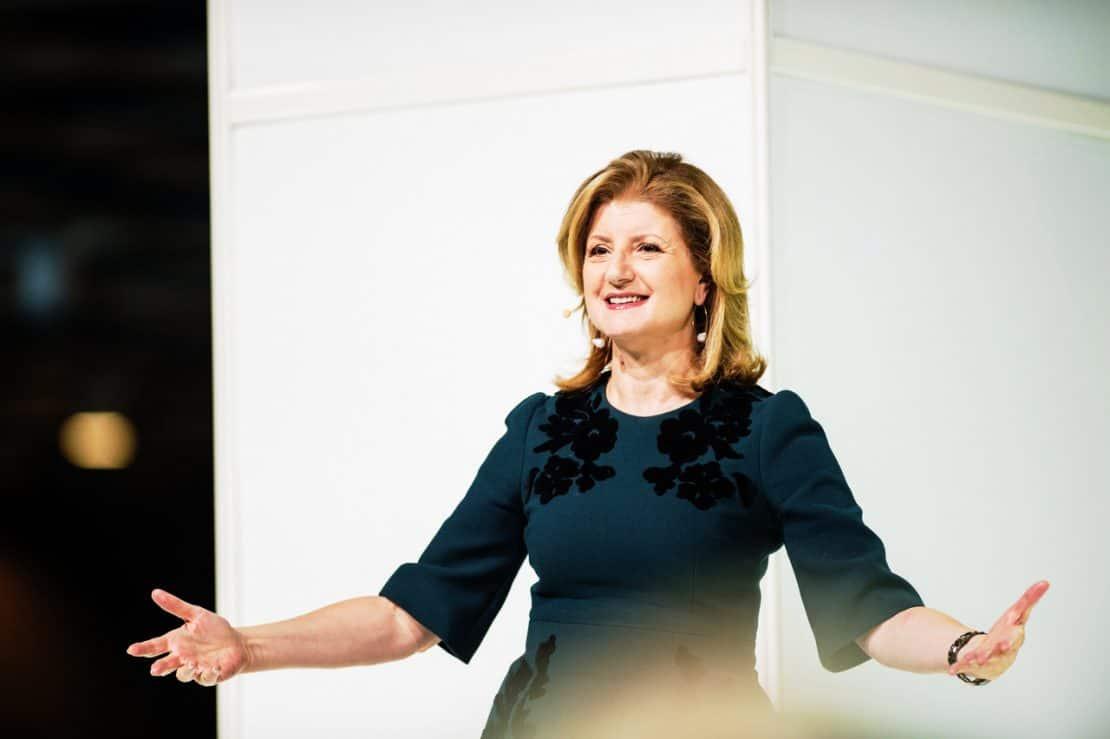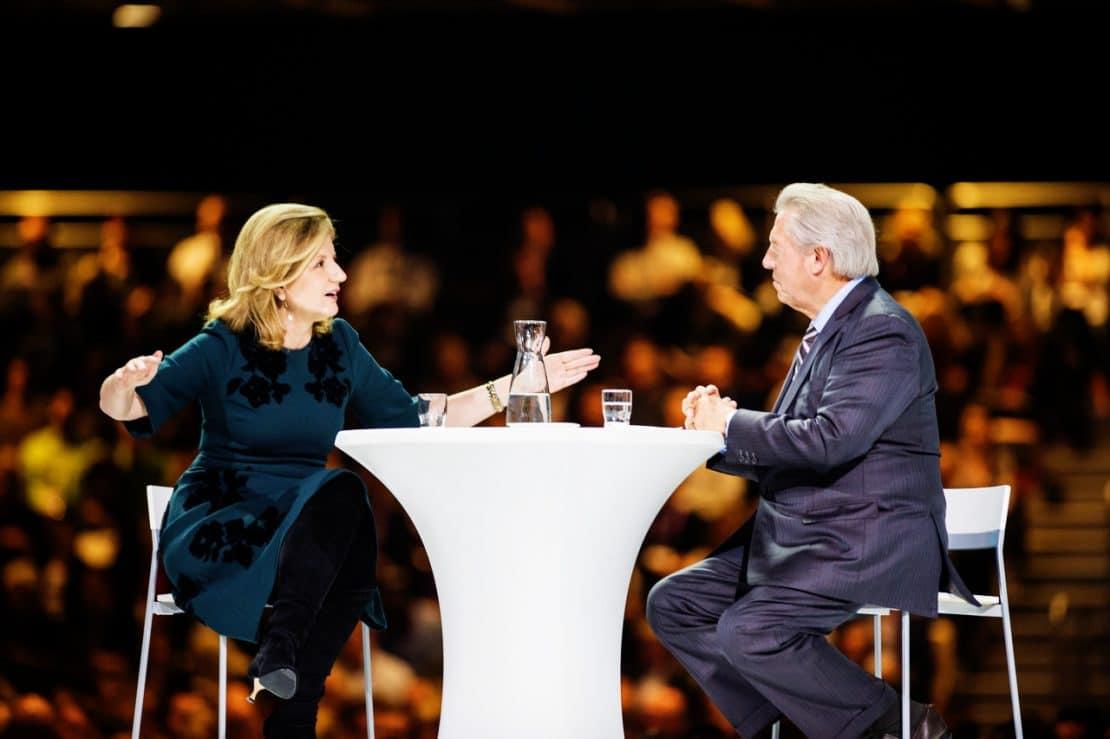18Dec2015
Forget the old saying: “If it bleeds, it leads”. Good news is smart business.
With the traffic of Helsinki causing the Nordic Business Forum audience to wait eagerly, when Arianna Huffington did arrive on stage we immediately relaxed into what felt like a cozy chat with an old friend. Her calming voice with the gentle, rolling tones of her soft Greek accent had the audience captivated from the moment she opened her mouth. Far from being “the bane of [her] existence,” as she described it, her accent was an embodiment of her authenticity.
Engagement for life
Huffington begins with a compliment and a challenge. She says she is here to talk to “a group of entrepreneurs, a group who really wants to change the world.” She believes that ‘passive consumers’ are now a thing of the past and the most important thing – not only for media but for businesses too – is engagement. She is here to show how the media has changed and made it possible for this to happen: “we don’t just consume news, we pass it on, we add to it, we share it. There has been an unprecedented engagement in the way readers, viewers, engage with the content.” It is on such a basis that the Huffington Post was founded, developing a way to make freedom and openness an asset; as Huffington states, “ubiquity is the new exclusivity. Our promise to our readers is to offer them the best of web, whether we produced it, we linked to it or our bloggers wrote about it.”
Traditional journalistic values are still highly valued, such as investigative reporting, fairness and accuracy. However, the stories are now enriched with an open dialogue and multiple perspectives. Anyone can contribute, from Presidents to homeless teenagers!
It’s a lifestyle thing
The audience shifts excitedly in their seats, responding to Huffington’s change in tempo. Subconsciously we recognize we’re moving onto a topic of real passion for our speaker. It is not for nothing that wellbeing and fulfilment are the subjects of her new book. She is fully aware of the resonance this subject has, both across the globe and for her host nation: “I know it’s a big issue here in Finland with a lot of people down-shifting and wanting to move from a life of achievement to a life of meaning.” Low-stress living as a means for a more productive life is a central tenet of the Huffington Post. “Do we define success just in terms of money and power? That is a bit like trying to sit on a two-legged stool – sooner or later you fall off.” The third leg of the stool, or ‘third metric’ as she has defined it, includes not only well-being but also wisdom and wonder. She firmly believes that “‘burnout’ has become civilization’s disease.”
She recognizes and acknowledges the duplicity of the phenomena she is promoting. “[It’s] been absolutely amazing to see the double impact of technology on our lives and on the media. On the one hand…it has been incredibly liberating,…[whilst] on the other hand it has been enslaving.” She shows great concern for the inability of people to disconnect, highlighting our addiction to mobile phones and how “fascinating [it is] that we take better care of our smartphones than we take care of ourselves.”
The positive dominance
Many who follow mainstream news will be forgiven for thinking the world is a horrible place. Huffington and the guys at Huffington Post are so concerned about the unbalanced nature of what stories we are exposed to that they are doing something about it. The ‘What’s Working’ section of the Huffington Post is, as Huffington puts it, their “attempt to re-imagine journalism.” As she points out, “there are a lot of horrible things happening in the world but it is not 95% bad!” At the Huffington Post they are trying to put a spotlight on the constructive things people are doing to solve problems around the world. They may be ideas that are small, but if the “media gave them more oxygen” the potential to scale them would be radically increased. They have also launched another dedicated section called, “‘Good News’, [so] anytime you are depressed you can go there and feel optimistic about the world and human nature again.” A real campaign to put positivity back on an equal footing.
Responsible journalism
As Huffington has already stated, responsible journalism is an important value for the Huffington Post. So much so that the presidential campaigning of Donald Trump has been shifted to the ‘entertainment’ section. She goes on to explain that the “media are giving him way too much attention because he is very good for ratings – as a result they fuel the Trump phenomenon!” However, this is more than a joke for her. She conveys her genuine concern when she points out that, “if you had a candidate here in Finland…who…believed the earth is flat, you would not take him seriously! Well I believe that anybody, who believes that [President] Obama is a Muslim, or was not born in the United States, is equally illegitimate.”
The culture of journalistic responsibility that Huffington fosters at the Huffington Post goes even further. As more than “just idle observers,” the Huffington Post journalists are challenged to look at the news in new ways. This is particularly true of their political coverage, which is entitled, ‘Beyond Left and Right’. There is a need to shake off the shackles of old preconceptions about how the world can work, and the Huffington Post wants to be at the forefront of a solution-based discussion.
Lead the change
For me one of the most important aspects of leadership is how do you avoid the icebergs before they hit the Titanic?
Being prepared and engaged in change is a vital driver of the Huffington Post’s success. For Huffington, it’s not possible to ‘future proof’ your business. However, what you can do is “to look ahead, and…to constantly…see your business as a work in progress.” Media is a great example of an industry that didn’t see the opportunity for change, leaving a vacuum to be filled by the Huffington Post. Huffington is focused on not making the same mistake, reminding her staff that, “either we constantly disrupt ourselves or we are going to be disrupted.” The changes she tries to incorporate into the workplace are an extension of this principle, including the two ‘nap-rooms’ she has introduced to the newsroom.
She provides examples of other organizations making strides in this area, such as the insurance company EDNA. Introducing stress-reduction measures amongst their employees, they noticed a “7% reduction in healthcare costs and 62 minute a week improvement in productivity.” In addition to the innovative nature of such an approach, Huffington also points out that the “minute these things begin to be measured, it is going to be an accelerated shift.”
Sleep. Don’t surf!
Issues that fascinate Huffington include areas such as, “what creates stress, questions of productivity, creativity and how are these affected by how we take care of ourselves.” Such topics have been covered by the Huffington Post for 8 years, but are now becoming part of mainstream business journalism, “in the pages of business magazines, the Harvard Business Review, the Wall Street Journal, the Economist [etc].” When it comes to sleep deprivation Huffington is on a mission, which is not surprising when, not that long ago, she herself collapsed from exhaustion. The value of sleep is conveyed to her audience in the best way: “A lot of you are entrepreneurs and you know that the most important thing you bring to your business is your judgement, not your stamina.” She admits herself that the most important hiring mistakes she made were when she was tired.
After she warns about the over-stimulating effects of caffeine after 2pm, she then asks how many of the audience sleep with their smartphone by their bed. She is left completely aghast at seeing so many hands raised. She immediately stops the flow of her speech, telling us that all devices must be turned off 30 minutes before sleep and removed from the bedroom. She emphasizes this is “the most important thing you heard from me today – forget everything else!” She is glad that the culture around sleep is changing in business and the macho attitudes that saw going without sleep as a badge of respect are now dissipating.
Journalism of the people, for the people, and by the people
Being in the driving seat of the New Media is the essence of Huffington’s mission at the Huffington Post. The democratization of the media has not only led to the involvement of everyone in the creation and delivery of content, it has also started to change “the way businesses…and…politicians operate.” As Huffington has already highlighted, authenticity is no longer a choice. Gone are the days when journalists tell “the world how it is from mount Olympus.” One of the key points in her closing is the opportunity for people to engage in the dialogue. She cites the comments section as a cornerstone of what makes the new media great. However, abhorrent personal attacks from Internet trolls have caused anonymity to be removed from the Huffington Post. Except for cases of whistle-blowers, they are challenging people to take ownership for their comments and actions in order to preserve civility and ensure the survival of open debate.
Huffington closes by recognizing that the world is facing many difficulties, from Syria to terrorism to climate change. Huffington holds an unwavering belief, though, “that human beings have all that it takes to resolve [these] crises, provided that we can reconnect with our own wisdom.” The collective contributions we can all make and the circulation of solutions through social media can have a pivotal and unquantifiable impact, giving us all cause for tremendous optimism!
Arianna Huffington is the chair, president, and editor-in-chief of the Huffington Post Media Group, and author of fourteen books. In May 2005, she launched The Huffington Post, a news and blog site that quickly became one of the most widely-read, linked to, and frequently-cited media brands on the Internet. In 2012, the site won a Pulitzer Prize for national reporting. She has been named to Time Magazine’s list of the world’s 100 most influential people and the Forbes Most Powerful Women list.



